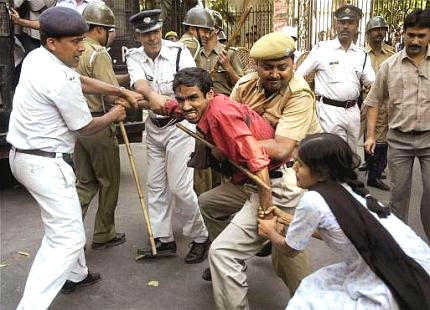Human rights in India
The situation of human rights in India is a complex one, as a result of the country’s large size and tremendous diversity, its status as a developing country and a sovereign, secular, democratic republic, and its history as a former colonial territory. The Constitution of India provides for Fundamental rights, which include freedom of religion. Clauses also provide for Freedom of Speech, as well as separation of executive and judiciary and freedom of movement within the country and abroad. It is often held, particularly by Indian human rights groups and activists, that members of the Dalit or Untouchable caste have suffered and continue to suffer substantial discrimination. Although human rights problems do exist in India, the country is generally not regarded as a human rights concern, unlike other countries in South Asia. Based on these considerations, the report Freedom in the World 2006 by Freedom House gave India a political rights rating of 2, and a civil liberties rating of 3, earning it the designation of free.

India : Human Rights news
India has not ratified the Convention against Torture and Other Cruel, Inhuman or Degrading Treatment or Punishment (CAT) with torture remaining rampant as a method of criminal investigation in the country. Even in more developed areas of India, from the point of view of the educational level of the people, like Kerala, torture is still common. The widespread use of torture occurs despite commendable judicial decisions, such as the famous Basu vs. the State of West Bengal, which laid down detailed rules on arrest, detention and the like, which, if applied, would lead toward the elimination of torture. The prevalence of torture is also not due to the lack of forensic facilities or forensic training available to the Indian police; for in recent years, there has been considerable sophistication achieved with regard to equipment and training. Torture though remains endemic due to other factors, such as bribery and corruption and the lack of a speedy and efficient disciplinary control mechanism. The tolerance of torture by higher-ranking officers and some prominent politicians of the central government as well as various states has not ceased. The failure of the Indian government to ratify CAT is itself a manifestation of the irresoluteness on the part of the state to bring this evil practice to an end.
In addition, India’s record on delays in adjudication, including matters of criminal justice, are among the worst in the world. Court cases may go on for five or 10 years or even longer—delays in the judicial system that virtually distort the whole process of justice. The prevalence of these delays prevents the possibility of judicial enforcement of the basic rights of the people. While the higher courts still produce significant judgments, the justice that the average litigant receives is still of a primitive nature. Delays allow corruption and negligence. Accusations of corruption among some of the judiciary of all ranks are now an open accusation that has not been reputed in any credible way.
Another major problem facing the country is the caste system. Despite many commitments expressed by India’s best-known leaders since independence to end this great social divide, it is still one of the greatest obstacles to progress in Indian society. Dalits, or “Untouchables,” for instance, are among the worst victims of torture and other abuses of human rights in the country. Dalits also suffer from delays in justice and the absence of access to justice. Thus, their misery is specifically linked to serious defects in the criminal justice system.
The absence of justice also contributes to deeply entrenched poverty and starvation. The AHRC’s studies on starvation deaths have revealed that there have been deaths caused by starvation even due to the negligence of magistrates who have particular responsibilities relating to these matters.
In short, the neglect of justice in India is of such a proportion that it challenges India’s claim of being a vibrant democracy. India’s democracy, in fact, is fundamentally flawed and is unable to maintain the rights of its ordinary folk. The powerful, for the most part, are still above the law.
Source : www.humanrightsblog.org




